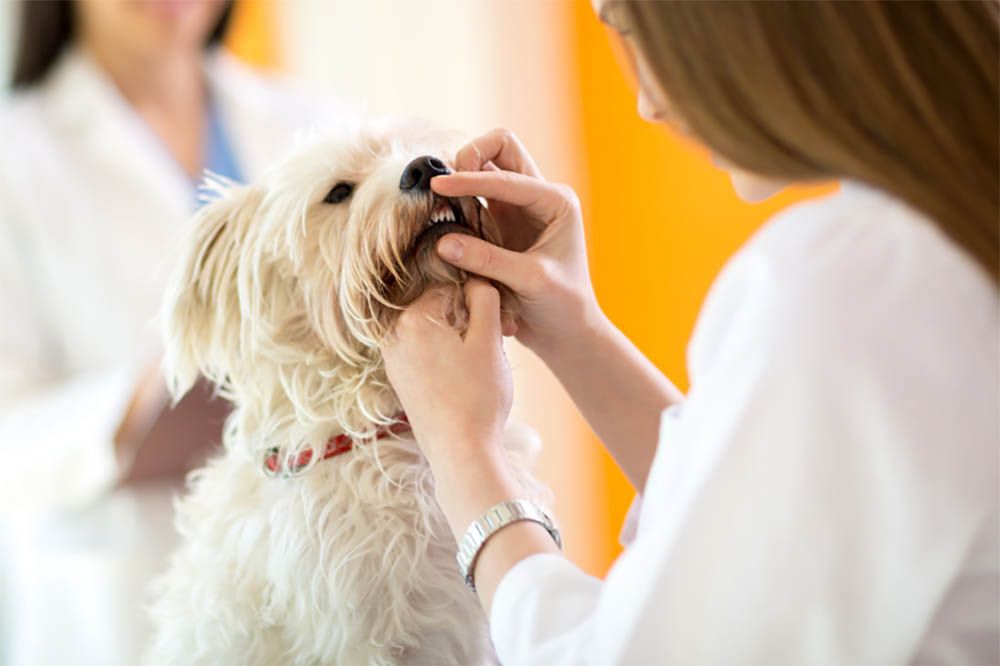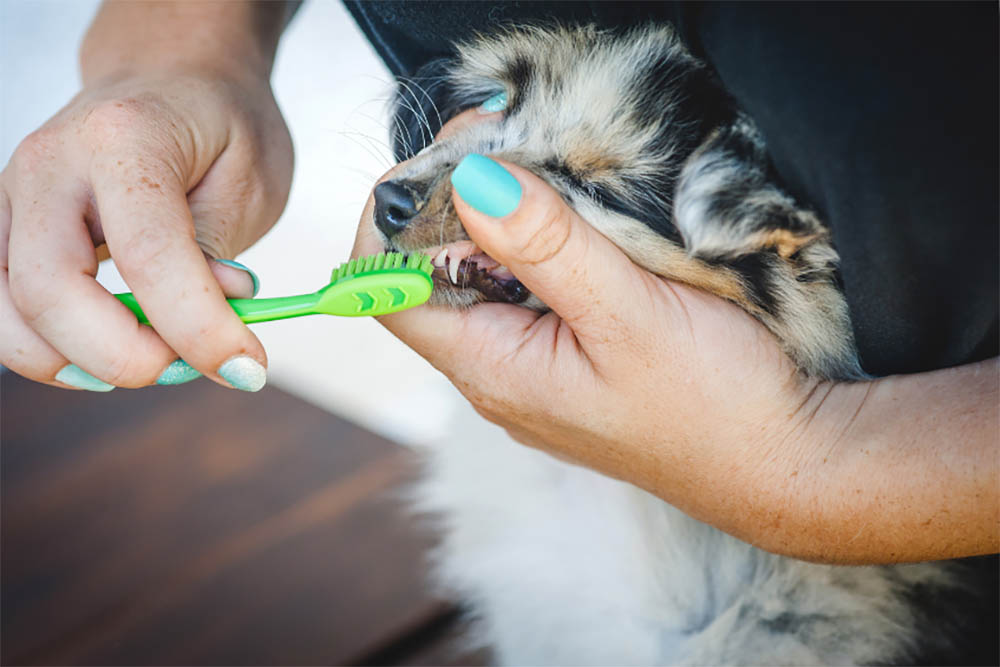Dog breath isn’t typically associated with a pleasant smell, but many puppy owners feel differently about the scent of their pooch’s breath.

This is because young dogs have a distinct smelling ‘puppy breath’ that doesn’t always create an unpleasant stench like the majority of fully grown dogs. In fact, it often carries a sweet aroma.
The exact origins of the puppy breath smell aren’t entirely clear. A number of professionals and vets believe that the unique sweetness of the scent derives from the milk-only diet that puppies enjoy when they’re young.
The enzymes in milk are complex sugars that break down in the digestive system of dogs. This explains why the odor of puppy breath is often described as a sweet, milk-like scent.
Conversely, some vets believe puppy breath smells better simply because they’re so young, and it’s unlikely that they’ll have experienced any tooth decay at this age.
Therefore, their fresh oral hygiene will contribute to a cleaner-smelling mouth. In all likelihood, it’s the cleanest it’ll be in their entire lives.
If you compare puppy breath to the breath of older dogs who are susceptible to a wide range of dental issues and gum disease, they’re polar opposites. Senior dogs are much more vulnerable to bad breath, adding further weight to the theory that a dog’s breath gets worse with age.
Another potential reason that many believe leads to pleasant-smelling puppy breath is the difference in gut bacteria between puppies and adult dogs. The bacteria present in the stomach of a puppy are understood to give off a sweeter odor than the gut bacteria of an adult dog.
While the above theories are all equally credible and bear some truth, there isn’t one definitive theory that negates the others. Just be sure to make the most of your puppy’s sweet odor while it lasts because it typically ends when they grow to the ten-week-old stage.
Why does my puppy have bad breath?
In contrast to “sweet” puppy breath, young dogs can also suffer from bad breath. Like all dogs, puppies are happy to put a number of things in their mouth, which can often lead to a piece of food or another item getting stuck in their teeth or gums.
Inflamed and injured gums are subsequently a common cause of bad breath, as well as more serious issues such as gum disease – which itself leads to severe halitosis. Indigestion similarly causes bad breath amongst puppies, but this is also noticeable through symptoms like diarrhea and vomiting.
Something else to consider, albeit more rare, is serious health issues such as kidney failure, which typically result in oral odor.
Don’t worry too much about this, as it’s incredibly unlikely, but just make sure you stay aware of any changes to your puppy’s breath. A typical indication of a health issue such as kidney failure is metallic-smelling breath.
A final common cause of bad puppy breath is their tendency to eat poop – yep, all types of it. Thankfully, the majority of dogs grow out of this phase when they reach adulthood, but puppies love it.
It’s recommended that you keep a close eye on them during their initial housetraining stage to prevent them from eating their own poop and getting a taste for it.
The best method of doing this is to clean it up immediately after they’ve done the deed and keep it as far away as possible from them. To put it simply, eating poop, unsurprisingly, will make their breath smell like poop.
Does brushing their teeth help with bad breath?
Brushing your puppy’s teeth is a process they won’t like, but it’s an effective method of preventing bad breath. It will allow you to thoroughly inspect your pooch’s mouth for any cavities or cracked teeth.
Brushing their teeth will also significantly reduce the likelihood of gum disease and other dental issues, resulting in well-maintained, fresher teeth.
Vets and professionals recommend cleaning your dog’s teeth once a day. This may sound like quite a commitment, especially as it’s not always the most straightforward ordeal, but the benefits are definitely worth it.

If you can’t commit to a daily cleaning routine, at least make sure you do it a couple of times a week. Starting this cleaning schedule in puppyhood is a great time to start and will allow your dog to become accustomed to the practice.
Now before you reach for a spare toothbrush and some minty toothpaste, it’s important to get yourself a specific toothbrush and toothpaste that’s specially formulated for dogs.
To make the ordeal all the more bearable for both parties, some pastes are even flavored with things like bacon. A popular brushing method is the finger brush technique, where a dog owner places a rubber toothbrush-like cap on their fingers and gently rubs the toothpaste on the dog’s teeth and gums.
Toothpaste specially designed for dogs doesn’t usually sud up, so you can let them lick it off their teeth and gums after you’ve finished.
Moving away from brushing-based cleaning techniques, there are chew toys available to purchase, which can also help to maintain your puppy’s gnashers.
The rubber variety of these chew toys are great for serving this specific purpose. Not only do they keep dogs entertained, but they also keep their teeth clean and healthy.
For puppy parents, this oral health hack is a useful method of tricking your dog into cleaning their own teeth during happy and content playing with a toy. A win-win situation!
Teething process
Like humans, dogs undergo a teething process when they’re young. As they lose their sharp baby teeth and start growing adult teeth, this process will cause them to bite down on pretty much anything they can get to fit their mouth around. This typically includes hands, shoes, and furniture.
This, however, isn’t for the pure thrill of biting and destroying things; it’s ultimately to soothe their painful gums.
Therefore, if your puppy attempts to chew on something inappropriate or bites down on your hand a little too hard, don’t get angry, as all they’re doing is trying to ease their discomfort.
Your energy will be better utilized trying to redirect their chewing attention to something more appropriate.
Introducing soft toys for them to chew on is the best practice for causing minimal mess, yet optimal benefit. The best toy to soothe your puppy’s aching gums is the Kong teething stick.
This toy provides a soft surface for your dog to gnaw on and also features grooves that help clean their teeth simultaneously.
For those of you who’ve ever experienced the feeling of a wisdom tooth coming through, you’ll be fully aware of the pain and discomfort associated with growing new teeth.
Your puppy’s first teeth should start growing around the 4-week mark, resulting in a full set of baby teeth (usually 28) by the time they’re 8 weeks old. Roughly 4 months later, your puppy will be transitioning rapidly into adulthood, and their baby teeth will begin to loosen and fall out.
You’ll often find these littered around your home unless they swallow them when they’re eating or playing.
Within 2 months, all baby teeth should have fallen out, leaving room for your puppy’s adult teeth to grow. There are typically 42 in total.
Once your puppy’s adult teeth have fully grown in, it’s worth taking them to the vet for a check-up. This helps to spot any potential teeth or gum-related issues early on before they become more serious.
You may also want to take your pooch to the vet if they still have baby teeth remaining at 8 months old. If this is the case, consult with your vet, as the teeth may need to be removed.
Intervention
Ideally, it’s best to identify the cause responsible for your puppy’s bad breath before seeking professional advice and involving the vet.
For instance, if you’ve clearly seen your dog eat poop and then complain to the vet that their breath smells, you won’t receive any groundbreaking advice. You’ll just be wasting their time.
As mentioned earlier, if you take the time and effort to maintain your puppy’s dental hygiene and feed them a healthy, balanced diet, there shouldn’t be any major issues.
If they continue to have consistent bad breath despite your vigorous and thorough efforts to keep their mouth clean, it could be something to worry about.
Some of the common issues are a crack in one of your puppy’s teeth or a piece of food stuck in their gums. Both cases are best dealt with by contacting your vet.
Dogs past the age of 3 are most at risk for serious periodontal disease. Provided by the American Veterinary Medical Association, a list of the symptoms that ought to be taken seriously include:
- Abnormally bad-smelling breath
- Pain or swelling in the gums
- Retained puppy teeth
- A drastic change in appetite
There are other symptoms to look out for to best help your vet diagnose the problem. Some of the important ones to remember include:
- Urine-smelling breath can often be an indicator of kidney disease.
- Sweet-smelling breath (note, past the puppy stage) can be a result of your dog suffering from diabetes.
- Horrific-smelling breath that fills the room can be caused by liver disease.
If your dog has breath similar to any of the three described above, it’s best to get it checked out immediately.
Frequently Asked Questions
Why does my puppy’s breath smell like skunk?
Many people describe the sweet smell of puppy breath as similar to that of skunk. A strange concept, yes, but a large number of dog owners have all reported the same scent. This distinct sweet-sour odor is caused by many of the reasons noted in the guide above, mainly that your puppy is still showing signs of the milk-only diet they consumed in their early months.
Other potential factors that lead to this sweet, skunk-like scent include the fact that the puppy’s mouths are generally clean and haven’t experienced any form of oral bacteria or tooth decay. Their gastrointestinal tracts also contain different bacteria and flora to the guts of adult dogs.
Is it bad if my dog loses one of its teeth?
This all depends on the age of your dog. This is perfectly natural if your dog is a young puppy, as all puppies go through a teething stage.
This typically occurs in the first 8 months of their life, when all their puppy teeth fall out to be replaced by adult teeth.
If your dog is fully grown and an adult, losing a tooth is usually due to significant periodontal disease. These various gum diseases are very common in older dogs and can, unfortunately, affect the quality of their life.
If your dog loses a number of its teeth, it’s recommended to get a vet to assess their mouth as well as their general health.
Final Thoughts
While it certainly isn’t every dog owner’s favorite thing to do, monitoring and maintaining a dog’s dental hygiene is vitally important.
Just as it’s their duty to walk them, feed them, and pick up their poop, dog owners should regularly clean their pooch’s teeth to prevent bad breath and more serious dental diseases.
Different scents of breath typically indicate different problems, so it’s important to educate yourself and learn the best methods of keeping your dog feeling good and smelling good. Hopefully, this guide has helped in that respect!
